*The asterisk in the title is only there to not trigger any algorithm that might get my blog bounced.
“Don’t swear!” we are told, as little children growing up.
“That’s not a nice thing to say.”
(Or in my case “Nice girls don’t say that…” 🙄)
And as we get older
“Mind your Ps and Qs!”
“Respect authority (without checking they deserve your respect)!”
“Wave your flag boys, some nob in a gold car’s on the way!”
The inherent biases that have developed round ‘swearing’ are a major reason as to why we need to rethink language when used as a tool of oppression. Where have these words come from, why do we use them and how have they acquired so much power? And why, instead of just telling people not to swear, can’t we just think before we speak instead, so we can control our own personal reactions to words we don’t like?
Where ‘rude words’ came from
In the ‘British Isles’ at any rate, the words many think of as particularly rude or harsh are usually Germanic (or in the case of Wales, Scotland and Ireland, Welsh and Gaelic terms respectively, which will be covered in full in another blog) in origin. The reason(s) for this I hope will soon become apparent; and proof that suppressing the language of people by a new, invading force is all part of not only taking over new lands and those who work that land, but a way of being able to keep hold of them, shaping their minds and attitudes, will be provided.
So, think of some of the ‘worst’ swearwords and insults you know. You may have seen them in books, or on TV, and in films, or heard them on the radio or when your parents or friends say them. In 2016 there was a huge Ofcom study on which ‘rude words’ were deemed the most offensive, do you agree with them?
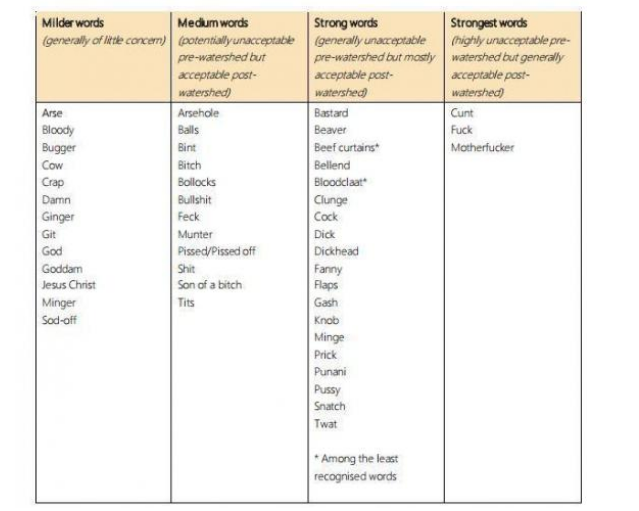
The article goes on to say
“Words rated as mild were thought to be okay to use around children, whereas medium words were seen by most to be potentially unacceptable before the 9pm watershed. The vast majority thought the strong words should definitely be saved for after 9pm. For sexual insults, most words were rated as strong.” [My italics]
These words can be arranged into this handy little Venn too. It’s for football refs to help them adjudge when a player has gone over an acceptable line, but roughly appears to follow the Ofcom survey results. Note homophobic insults (pansy), female based insults (twat, bitch, tits) and non sexual bodily functions are yellow card offences, while racial abuse and and the ‘F’ and ‘C’ words are shown the red card. And there’s an orange overlap littered with references to sexual body parts (mostly male), sex work (whore) and sex but in a judgmental way (‘bastard’, ‘slut’ and ‘shag‘). (Interesting that ‘piss’ is seen as worse than ‘shit’, unless the context of the word ‘shit’ is escalated, then it turns into a red card offence!)
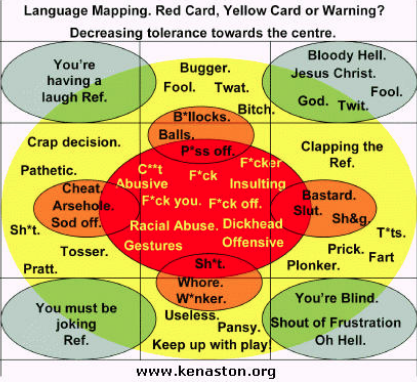
Essentially, the ‘worst’ words are words to describe sex, which is a perfectly natural function, and of female body parts only, which again are just organs like any other body organs. And ‘religious’ ones barely get a look in now but in

!!!
So did you pick ‘cunt’ and ‘fuck’ as the ‘worst’ words? If you did, you’re not alone. And do you ever use them, even under your breath? Sometimes, swear words can creep up on us, especially when something shocking or stressful happens.


But where did they come from and what do they actually mean?
Cunt.
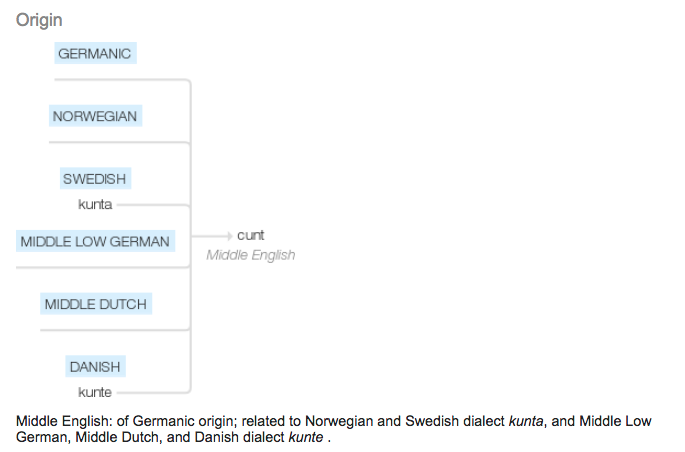
A rarely used word until relatively recently

It is described as ‘vulgar slang’ whether someone is using it as insult or a female body part. Not for the word ‘cunt’ is the word reclamation that ‘gay’ and ‘queer’ have had. But why? As Matt Hunt rightly says in his excellent blog, it’s part of
“our culture’s negative attitude towards femininity. ‘Cunt’ is a primary example of the multitude of tabooed words and phrases relating to female sexuality, and of the misogyny inherent in sexual discourse.”
But that doesn’t mean we can’t reclaim it. Words drift in meaning all the time. So we need to examine exactly why ‘we’ react more strongly to the word ‘cunt’ than the word ‘fuck’ though both are deemed equally and strongly ‘offensive’. Perhaps a clue can be found here, as raised by Matt later in his blog.
“‘Cu’ [the first syllable of ‘cunt’] also has associations with knowledge: ‘can’ and ‘ken’ (both ‘to know’) evolved from the ‘cu’/’ku’ prefix, as, perhaps did ‘cognition’ and its derivatives. RF Rattray highlights the connection between femininity and knowledge: “The root cu appears in countless words from cowrie, Cypris, down to cow; the root cun has two lines of descent, the one emphasising the mother and the other knowledge: Cynthia and […] cunt, on the one hand, and cunning, on the other” (1961).
Indeed, there is a significant linguistic connection between sex and knowledge: one can ‘conceive’ both an idea and a baby...” [my italics, and any additions shown in square brackets]
So, basically, the word has twisted from being a word that meant to bring forth life and to have some knowledge of and therefore agency or say in that process to the worst ‘swear word’ in the English language. Even above the action (fuck) that can lead to creating babies. So why has women’s agency and independent sexual power/knowledge been removed from the word? 🤔 Why indeed… why even bother to push for a change that really needs to be made: for those who misappropriated it in the first place to stop using it to hurt, either, and using our knowledge of the word, remove the power and negativity is has as an insult?
Picture it:
“You’re a cunt.”
“I agree. I’m someone with power, knowledge and my own say in all the things that appear to be pissing you off right now…”
It is simply the ‘adult’ version of ‘I know I am, but what are you?’ 😉
Shakespeare had no such fear of the word, or the power and individual agency of a cunt. But he knew it could shock as a word not be said aloud in ‘polite company’. Here, in Twelfth Night, Malvolio is reading a letter he believes is from his mistress (i.e. employer) Olivia
MALVOLIO
By my life, this is my lady’s hand. These be her very c’s, her u’s and her t’s, and thus makes she her great P’s. It is in contempt of question her hand.SIR ANDREW
Her c’s, her u’s and her t’s. Why that?
We are meant to laugh at, or even pity Sir Andrew for saying this and not getting the ‘joke’ of Malvolio reducing the words (and thoughts) of a women to her ‘parts’, not at Olivia for having those body parts. Seems Shakespeare was well aware of the hypocrisy surrounding the word, and if it hadn’t ‘worked’ as a feed line in the play for the entertainment of his audience, he’d have stopped using it. However, now we see both men who don’t display sex motivated behaviours and women who have the parts the ‘real men’ are obsessing over being made fun of, as the meaning of ‘cunt’ changed…
Few seemed worried by street names in the 1200s being called things like ‘Gropecunt Lane’ as a basic descriptor for where you could go if you wanted to hire a sex worker.

Yet medieval street names such as Addle Street (stinking urine, or other liquid filth) and Fetter Lane (once Fewterer, meaning “idle and disorderly person”) have survived unchanged. ‘Addle‘ is used now to suggest someone is confused, or perhaps a rotten egg! And fetter now more commonly known as some kind of chain to imprison someone, or an animal, literally or metaphorically. Why is that not a ‘worse’ idea than a body part, to deprive a living being of liberty? Even Petticoat Lane, which was never even in relation to prostitution, was in 1830 renamed as Middlesex Street, following complaints about the street being named after an item of women’s underwear! (The locals still call it the Lane in quiet if maybe unaware rebellion against Victorian ethics, and visitors can get quite confused!) So how come those words, deemed at least in ‘Addle’s’ case is a red card offence now, has gently drifted elsewhere, yet ‘cunt’ has not? Women piss too! Is it too much of a stretch to note that women’s pee has less ‘use’ in activities like tanning (creating leather)
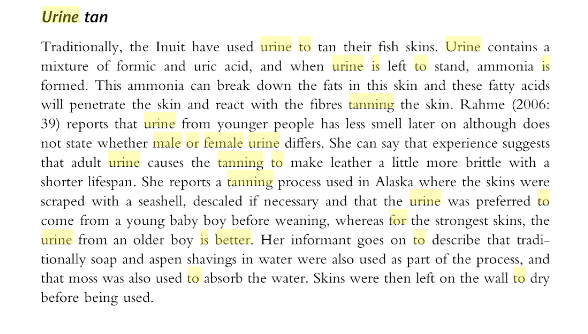
and agriculture, well known to this day. Head gardener Philip Whaites at Wimpole Hall only echoes what science has proven to be true: especially during ovulation and menstruation
“There are obvious logistical benefits to limiting it to male members of the team, but also male pee is preferable to women’s, as the male stuff is apparently less acidic.”
Going from 6pH (weak acid level) to a 5pH (slightly stronger acid) doesn’t sound like much but it could kill your plants or ruin your new hide you’re trying to turn into leather. And ‘women’ are closeted away in cubicles should they need to pee in public, yet ‘men’ are supposed to stand in a row at the trough… is this just custom that comes from body ‘plumbing’ or a symptom of something more oppressive? If this was purely about ‘plumbing’, and body parts that ‘stick out’ rather than ‘going in’ and thus hidden and often seen in some societies as ‘unclean’ somehow, why don’t people have a urinal in their bathrooms at home as a rule in the UK?
This hot mess from Leviticus 15:19-33 might go some way to explaining the suspicion of women’s bodily functions over ‘men’s’ that is prevalent in Western culture:
19 “Whenever a woman has her menstrual period, she will be ceremonially unclean for seven days. Anyone who touches her during that time will be unclean until evening.
20 Anything on which the woman lies or sits during the time of her period will be unclean.
21 If any of you touch her bed, you must wash your clothes and bathe yourself in water, and you will remain unclean until evening.
22 If you touch any object she has sat on, you must wash your clothes and bathe yourself in water, and you will remain unclean until evening.
23 This includes her bed or any other object she has sat on; you will be unclean until evening if you touch it.
24 If a man has sexual intercourse with her and her blood touches him, her menstrual impurity will be transmitted to him. He will remain unclean for seven days, and any bed on which he lies will be unclean.
25 “If a woman has a flow of blood for many days that is unrelated to her menstrual period, or if the blood continues beyond the normal period, she is ceremonially unclean. As during her menstrual period, the woman will be unclean as long as the discharge continues.
26 Any bed she lies on and any object she sits on during that time will be unclean, just as during her normal menstrual period.
27 If any of you touch these things, you will be ceremonially unclean. You must wash your clothes and bathe yourself in water, and you will remain unclean until evening.
28 “When the woman’s bleeding stops, she must count off seven days. Then she will be ceremonially clean.
29 On the eighth day she must bring two turtledoves or two young pigeons and present them to the priest at the entrance of the Tabernacle.
30 The priest will offer one for a sin offering and the other for a burnt offering. Through this process, the priest will purify her before the LORD for the ceremonial impurity caused by her bleeding.
31 “This is how you will guard the people of Israel from ceremonial uncleanness. Otherwise they would die, for their impurity would defile my Tabernacle that stands among them.
32These are the instructions for dealing with anyone who has a bodily discharge—a man who is unclean because of an emission of semen
33 or a woman during her menstrual period. It applies to any man or woman who has a bodily discharge, and to a man who has sexual intercourse with a woman who is ceremonially unclean.”

Excuse me? One verse for how ‘dodgy’ semen (sneaked in at the end) is, then it goes full Handmaid’s Tale with the obsession about menstrual blood. Both are about making natural functions bad or wrong or ‘sinful’ in some way- and control of these functions is almost impossible, true, but why hand that control over to a group of male only elders or some god? Is this really so far away from some people losing it today when they see a patch of blood at a woman’s crotch (or indeed, cunt!) This woman is an artist and was trying to make this very point, but had her photo removed from Instagram for violating their community standards just a few years back

This happens, and a lot less ‘neatly’ to most women; every month; for over thirty years! So what’s the big deal? Where it’s coming from? The fact it’s (as we were told over and again in school science) it’s a ‘failed baby’ and we’re supposed to go away and mourn or wallow in our failure at not being a ‘proper woman’ and making a baby this month, in seclusion (see the Leviticus extract above)?
How about fuck that oppressive bullshit!?
Fuck being neat or ‘tucked in’ with our labia, or shaved with our pubes, if we don’t feel like it; or cleaning and perfuming out of existence when in fact our cunts clean themselves–
or yes, bleeding through our pants (top tip- use cold water, as warm activates the enzymes) if we don’t realise the sanitary protection has given up the ghost- or god forbid, freebleeding!– why should we be shamed by society for that?
Do people think we enjoy washing out blood-soaked pants in the sink and having ‘period pants’ that are already bleached out by blood and warped by scrubbing?
Do you think we like it when people who miscarry get sympathy but those who choose to terminate are vilified and abused, so we keep it secret?
Of course if we overuse it (like any word) it loses almost all meaning. In Scotland for example, in vernacular speech, it has come to mean ‘person’ and is equally likely to mean just that as opposed to anything derogatory. Perhaps this is one option- to use it until it loses its ‘shock value’ (which tends to be my approach in informal situations). Or perhaps we could find another word and use that till it’s coined, one that does not remove individual agency to women? But isn’t that how swearwords work? They shock, they stimulate our nervous systems, they disgust…
It’s been used a lot in this section of the blog. Is it still upsetting/ vile/ common/ rude? And people can choose to use it or not, and call out on people who are using it to be misogynist, whilst acknowledging their own reaction (assumption that it’s a ‘nasty’ word and not taking into account its powerful origin is also misogyny) is also fuelling the inequality of swear words we now have in our society. All words have context and nuance, and ‘swear words’ are no exception. When we tell women that the word that was used to simply describe and sometimes celebrate the female sex organ is now deemed the nastiest word in the entire English language, and they accept it without question, and adapt their language accordingly, we are betraying them.
Not all those who use the word ‘cunt’ are misogynists, but all misogynists are pretty much guaranteed to have used the word ‘cunt’ to back up their misogyny. Don’t see why we should let them…
You don’t need to agree with me, just have a think about what’s actually happening when people say and react to the word ‘cunt’.
More on this later, but in the meantime…
Fuck
You may have noticed I have used this word a few times already for emphatic stress in this blog. This was a deliberate decision after deeming them appropriate in the context in which they were used. You may not agree, of course, and that’s fine. But in my ‘defence’ 😉 its versatility (videolink) is almost second to none! Grammatically, it’s become a noun, verb, adjective, adverb and exclamation of anger, disgust and surprise. And unsurprisingly its origin too when it comes to being introduced to the British Isles is most likely to be Germanic;
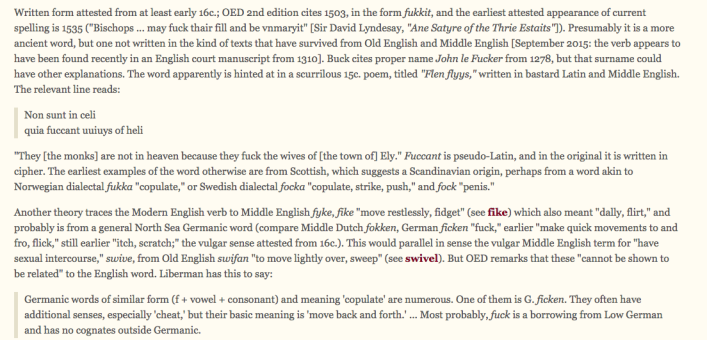
coming over during the invasions of Angles, Saxons and Jutes in the late 5th century.
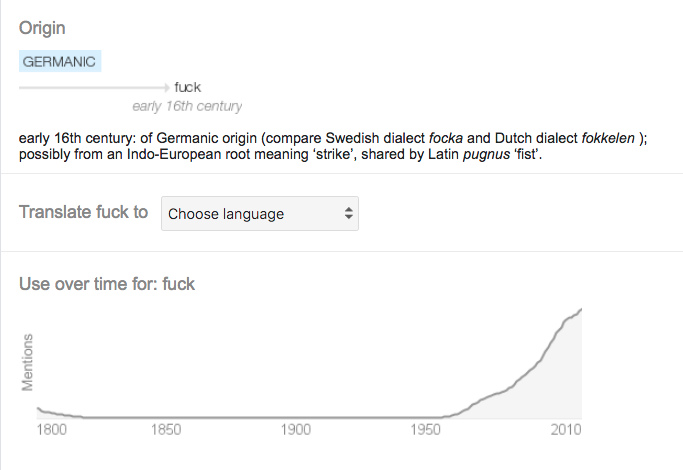
It’s almost impossible to trace the usage before the 1800s, however, as ‘fuck’ was deliberately omitted from the first dictionary created in England. However, that by definition (!) suggests it was such a well known (to be) inappropriate common word for intercourse that Samuel Johnson, who compiled the dictionary from word records taken all across the Isles, made a judgment call and did not include it.
However, it does appear to have started life as a verb- an action that is fast and repetitive, like rubbing or striking. (As is frottage, yet that’s not seen as ‘rude’, merely ‘vulgar’ in context only! It’s not even on Ofcom’s ‘naughty word’ list (see above.) Call someone a ‘frotter’ and the reaction would be minimal…Why? Because it’s of French and not Saxon origin. (More on that later.) But saying someone’s a ‘fucker’ would be a red card offence.)
So why is fuck seen as perhaps the second ‘worst’ ‘swear word’ in the English language? Why did to go from
an admittedly coarse verb for the sex act [attested in words written in the 1600s] as just “an act of sexual intercourse,”
a word so ‘unseemly’, only to be spoken by common people, not by people who ‘should’ know better, that it was omitted from the dictionary?
Has its very versatility, as a verb describing the sex act and as an intensifier (e.g. ‘The queue at the post office was fucking ridiculous’ indicating never-before-seen queues) been used to oppress/silence/police the tone of people deemed to be uneducated or disadvantaged in some way (class, poverty, place of birth), just like the word ‘cunt’ has been used to oppress women? Because the word ‘fuck’ means just about anything but more so, it can mean just about anything? It doesn’t seem to have lost its shock value, that’s for sure. So whatever the process behind it, it has been sustained in society for centuries.
Would it be ‘worse’ to call someone a ‘cunt’ or a ‘fucking cunt’ (thank you Derek and Clive!)?
Does adding the word ‘fuck’ escalate it?
And why do you feel that?
Would you look down on me if I told you that sketch by Peter Cook and Dudley Moore in the link is one of my most favourite pieces of comedy?
Would it change your perception of me, as perhaps me using the word ‘fuck’ in the ‘cunt’ section of this blog might have done too? (And yes, that phrasing is both problematic and deliberate.)
Did you think me using it weakened my argument? If so, would just taking the word ‘fuck’ out make my argument valid? Why?
Did Yahoo! CEO Carol Bartz deserve to be fired by phone for long term usage of profanity, including the word ‘fuck’, throughout her two-and-a-half-year tenure? If so, why? If not. why not? And (from the same article in that link) does anyone deserve what seems to be the
social cost of cursing. In this case, women coping with breast cancer or rheumatoid arthritis wore recorders, and researchers duly noted their usage of profanity among friends and family. What they found was that the women who cursed—even those who uttered the relatively mild crap—received less support from loved ones.
If anything deserves a ‘what the fuck?’ in my mind, that piece of social policing does!
The thing is, it’s not just about the sex act. Otherwise removing the word from an exclamation and replacing it with its scientific equivalent would not be (subjectivity alert) more hilarious than using the word ‘fuck’ outright! Monty Python knew, just as Shakespeare did, (for example) that to imply a ‘rude word’ was often more effective than saying the word(s) outright.
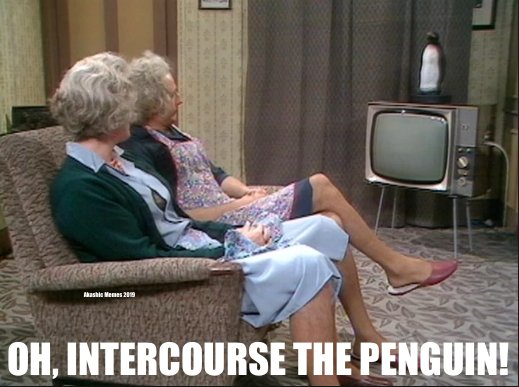
So what’s so funny? Is it because we are reminded of a (usually older) relative that said ‘sugar’ instead of ‘shit’; ‘fudge’ instead of ‘fuck’ and ‘heck’ instead of ‘hell’, (see page 3 of this excellent work by Mohr of a very telling example of this) but we all know what they really mean? If so, that seems like a universal vehicle of humour to point out both sides of a word, by using characters that don’t get the joke, or do but go to torturous lengths to avoid saying the words that invoke the reaction from others. Pratchett uses the assumptions of ‘rude’ word usage and substitution for humourous purposes too.
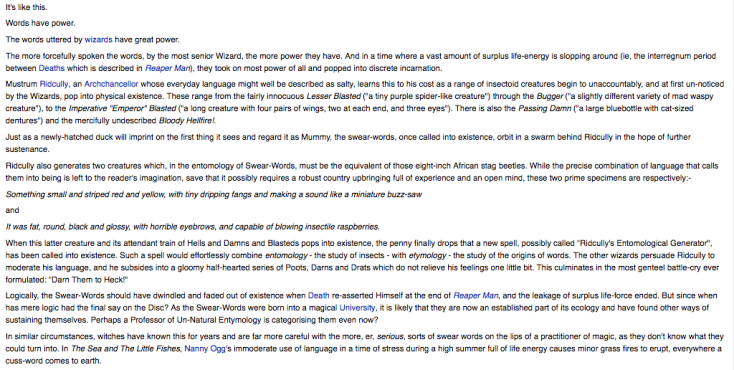
In Pratchett’s world, words can literally have their own life force, and the ‘worst’ ‘rude’ words manifest as sinister sounding insects. And we have seen how words seem to do that in ‘our’ world too, changing in meaning and context over time; usually negative; and usually as a result of some change in social ‘sensibilities’ (like changing the road names above), to ‘civilise’ the words that come from a more ‘earthy’ or less ‘refined’ past.
Is it, as shown in the treason blog, just the takeover and manipulation of the very words we speak and use to make sense of our world by elites to help keep the population under control?
What are we really saying to our children when we tell them not to swear?
Or each other?
What is really going on?
If these words had no purpose, they would have long fallen out of use by now.
How did some ‘rude words’ end up ‘rude’ in the first place?
You may have noticed in the each section of this blog that I have highlighted in blue ‘informal situations’ and ‘common’. Here’s why.
This combination of context (when/where you say something) and implying that usage of these words implies some kind of lack in skills society ‘requires’: mental deficiency, ‘bad’ (read ‘poor’) background or substandard education (or a mix of any and all of those) is a vital part of what is going on. And who sets those rules?
In part one of these ‘Nuance’ blogs I looked at how one single and mostly non existent law (The Magna Carta) was merely a power grab by the Norman ruling class, with no consideration whatsoever for the rights and protections of the many. It is those people, and the descendants of those people, who have set those rules controlling what you say, and insisting you impose a scorched earth policy on using those words around humans that must not hear or absorb crude sexual terms due to age/ perceived weakness or fragility (namely children and women) while, in the case of women, being disproportionately the subject of them?
Who benefits from this?
And in part two of the ‘Nuance’ blogs, I checked out how we use the word traitor, and lo and behold, found a very similar pattern. When we yell ‘traitor’ at someone, we’re actually saying that the safety of the monarch, chancellor of the exchequer and judges is more important than the safety of the many.
Who benefits from this?
So how does this apply to when we swear? How do those words wind us up so much?
Well, this may well be a chicken-and-egg scenario (yes, I know we know the answer to that now 😉 ) but many studies have proven that not all words cause the same reaction in our brains.
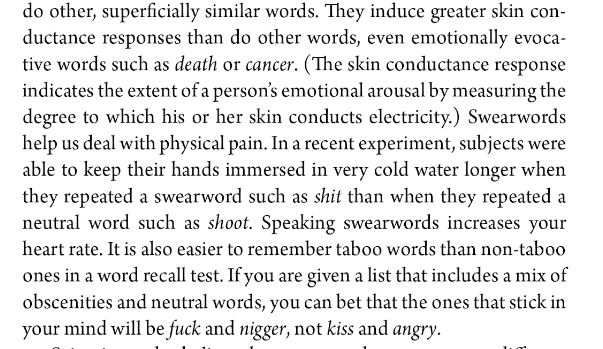
This is proven in various studies because swear words seem to get a frontal cortex response, which is linked to emotion; but ordinary language resides on the left side of the brain, where we analyse and collate. (Knowing that makes it easier to understand why stroke victims who lose the ability to talk can sometimes still spew ‘profanities’ as deftly as Malcolm Tucker in The Thick of It; and could go a little way to explain some of the symptoms of Tourettes.) In some studies we see that people who throw in the odd ‘bomb’ are seen as more ‘real’ and ‘credible’ somehow; others suggest that the adrenaline released by such words contribute to the relief of stress or pain; and other still appear to show that if an individual is severely punished for using such words when younger, their emotional response will be higher still.
What is not clear is whether the words resulted as a result of a need for words that cause a visceral response in the limbic system, or the words, ‘bad’ and ‘forbidden’ as they became, acquired that frisson of excitement that only words that stimulate the frontal cortex can provide.
Either way, the words themselves clearly have a biological function. Sometimes this is so deeply seated that it’s been known for people to come round from deep medical sedation enough to be upset by someone swearing loudly nearby. And I think the those that could read, and have access to books, and insist all books and pamphlets be in their language (in the case I am thinking of, Latin and Norman French) may well be able to work that out and use it against their workforce just as quickly if not more so, than those under their power in Norman ‘England’ (who as shown in the Magna Carta blog brought feudalism with them, a system of rule and control we still suffer from the effects of today.)
This is not to say that the Saxons, Angles and Jutes who faced the Norman Invasion were unread, and even if they were, that that meant they were stupid. Far from it. Their twenty one and more year rebellion against William (I, the Conqueror) showed this as it’s just not possible to coordinate such dissent without sophisticated minds. Yet if you look at how it’s taught, you’d swear (!) as soon as Harold got the arrow in his eye, the Saxons all hailed their new Norman overlords…
And just like what the DUP are trying to do to Irish persons and the Gaelic language in Ireland today, the Normans bust a gut trying to suppress the language and customs of the Saxons who they faced at Stamford Bride and then Hastings. Words like ‘fuck’ and ‘cunt’ were right out, to be replaced by ‘proper’ curses and oaths like ‘bloody hell’ (which of course would later become ‘awful’ for religious reasons) which was like Saxon enough to catch on fast, but was diluting the earthy and open nature of Saxon culture and humour. ‘Bloody’ and ‘bloody hell’ enjoyed a brief revival for a couple of hundred of years after the end of the Middle Ages, as well as the development of some ‘milder’ words like ‘bugger‘ only to be reviled utterly by the Victorians (oh, that blood aversion thing again eh? With a bit of gay bashing thrown in for good measure…)
It’s not just who is saying them, but where and when they are said
Saying such words in ‘universally acknowledged’ no-go places like
- during rituals (e.g. funerals, weddings, coming of age ceremonies) or
- where ‘innocent’ individuals might be (a school or a kids’ party) or
- in places deemed as serious, formal and/or legal (court, parliament, parents’ evening, a medical appointment)
would actually give that word more power. (And as we have seen is a powerful vehicle for comedy.) Since these words ‘fuck and ‘cunt’ are ‘inappropriate’, ‘out of place’, ‘wrong’ or ‘ignorant of correct behaviour’ in many of the contexts they are used in, for some it has no ‘value’ except as a shocking, abusive term of defiance or dominance. But that’s the kicker isn’t it? Defiance and dominance.
Those who want to maintain social control over others try to censorship socially or with the force of law. Like other “politically correct” people, they make up an artificial and useless prohibition. If you do not submit to their rule then you are “obscene” and they feel justified in whatever punishment they can apply.
Now personally using the term ‘politically correct’ is clouding the valid issue this poster on Quora makes above, for ‘PC’ is just the legal reaction to societal inequalities, but yes, in my view it’s all about control. However these two issues, being ‘PC’ and ‘policing free speech’, re inextricably entangled in the public consciousness. This is because it is a question of degree, or nuance. Most of us might baulk at running into a funeral screaming ‘Fuck’ or ‘Cunt’ at the top of our lungs, but have no problem saying them if we drop something heavy on our foot. Some might actually check to see if there are kids about before they let loose. Or not saying anything deemed as coarse or common, substituting a harmless alternative like ‘whoops’ or just crying out in pain.
None of these approaches are ‘wrong’.
So who decided these no-go areas?
In short? Whoever is in charge makes the rules.
Rituals
For example, in Ancient Greek times (yes I know, vague, but this is a blog not an academic article- if you want that on this topic go here 😉 !) not only were women wholly in charge of the funeral process, from the preparation of the body to supervising its progress to its final destination. It was the women who led the ritualised screaming,crying, hair pulling and yes even swearing in ‘grief’ (some of it real, some done by paid mourners). The level of noise and protest, that to many of us today would seem very disrespectful had an express purpose of driving out the ‘pollution’ (feelings, actual emissions, detaching of the soul from the body). Pretty sophisticated reasoning, and all seen as part of the power of a woman, having this special knowledge of the path between life and death. In the New Testament however, this job is done by the men, with the women in seclusion and passive.
Protecting the Innocent
CW:RAPE
The idea of a child being innocent in law (in the UK) which tends to reflect and/or influence societal changes at least is quite a recent one, and, not uncoincidentally, came around at the same time as Petticoat Lane and other ‘rude’ words being deemed ‘indecent’. Thanks to the story of the ‘virgin’ Mary we already had an ‘innocent woman’ trope embedded into the social psyche of these Isles. It took a lot longer for children to acquire it. In 1275, (just 60 years after the Magna Carta) the first age of consent was 12 (Westminster 1 statute). And not till 1875, did the Offences Against the Person Act raise the age to 13 in Great Britain and Ireland, (before that it was only a felony to sexually assault girls under the age of ten (note there’s nothing on the assault of boys at all!) while at the same time increasing the severity in law for any women who tried to get an abortion, steal a child or hide the birth of a child. Ten years later the Criminal Law Amendment Act of 1885 raised the age of consent for girls to 16 (17 in Ireland). This was with the specific aim of reducing child prostitution and wasn’t terribly effective. And by putting the onus on the female child, it blamed and shamed her for having sexual contact– and the boys’ abuse was simply erased! Of course we see an echo today in how rape is treated in law and by enforcers of those laws. It’s hard enough for women to report it, but for men? Legally, societally, emotionally that sort of thing isn’t ‘supposed’ to happen to them… This ‘protection’ only came at a cost to other vulnerable and oppressed groups- poor women; gay men; and boys.
Location
This idea of a ‘time and a place’ is perhaps the most nebulous of the lot. Which would be the most shocking- overhearing someone mumble ‘Oh fuck’ when they drop their car keys in a puddle at the Lidl car park (children being present optional), or someone who stands up at the Queen’s Coronation and says it? Why? Some of this reluctance to bring anything not of the cerebral (cortex! Sorry, bad science joke, but apt) into a Church comes from when they could be used to claim sanctuary by almost anyone (till 1624 at any rate), no matter what crime it was said they had committed (the Magna Carta blog showed just how erratic shall we say that justice was for the poorer classes) but this ownage of words, just like the other examples, is used to control the mind and thoughts (sin) of the congregation. ‘Bad’ words ‘pollute‘ the mouth (Ephesians 4:29); are ‘devious‘ (Proverbs 4:24) and violent (Proverbs 10:1); with the declared intent of ‘bridling the body’ like one might a horse! (James 3:1-18) No wonder Fetters Lane got a pass from the pearl-clutchers but Gropecunt and Petticoat Lanes had to go!
Class
Now for many on the left, everything comes down to ‘class’ and class struggle, and here it is hard to disagree. This idea of knowing where and when something is appropriate is also called manners and ‘etiquette‘; which is directly translated from the French as ‘prescribed behaviour‘. From not knowing ‘which knife to use’ to just by an accident of birth growing up in a sink area where education in underfunded and spotty (not blaming teachers here) and opportunities, services and community facilities thin on the ground… Knowing when and where to and not to ‘swear’ can logically be seen as an extension of the deliberate exclusion from knowledge by the elite in order to mock and separate the poorer classes. We see this idea played out in front of us all the time in the media (by which I mean film and television as well as newspapers.) Here’s an interesting take on swearing in the classic TV series ‘Steptoe and Son’.
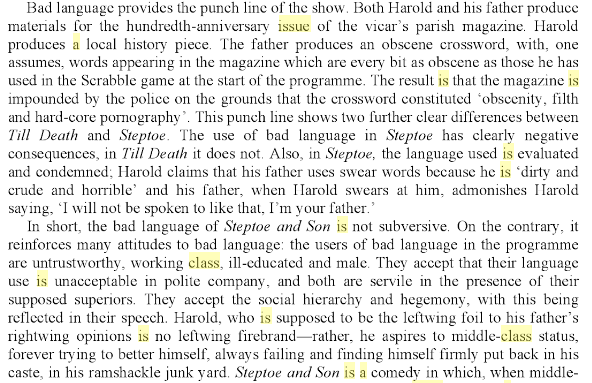
Here, aspiring to less ‘crude’ language is seen as both a parody of the trope that the person who swears is male, badly educated and working class and a parody of someone who wishes to ‘escape’ that stereotype becoming another one– a living embodiment of wanting that Room At The Top.
Who do we empathise with? Harold or his dad?
Why?
And more to the point, why not?
What can we do about it?
We all have ‘red cards’ in our minds about what we ‘should’ and ‘shouldn’t’ do or say and when/where we should or shouldn’t do or say it. Perhaps a good way to look at it is that PC makes law what should be universal ‘offences’ like hate crimes and sexual/ physical/ verbal/ emotional abuse, but our personal prejudices from our upbringings should not be imposed upon others; or our reactions seen as the only valid norm. The problem is that line too has blurred over time, mostly by a soundbite-eager MSM. And the Acts brought in to try and legislate for vulnerable minorities does attempt to address this, like in the 1986 Public Order Act, a small excerpt from which is included below.

The onus is on the one being caused distress. And while this helps the victim of harassment or abuse or even worse have some kind of legal redress, it doesn’t help when applied to people just reacting to a ‘rude’ word rather than looking at how that word was used, by whom, and when/where. This is the ‘being offended culture‘ or ‘snowflakes’ as the alt-right say (not implying the author of that link is alt-right) but conversely we also have to admit that there is a difference between being offended and offensive, and call out when something is ‘offensive’ (and here we are back to issues like abuse and hate speech.)
Here lies a problem. This Act basically grew out of the ‘Decency’ Acts of the Victorian era, some of which have been mentioned above. We already know that the The Criminal Law Amendment Act of 1885 raised the age of consent to 16, at the expense of rights of women and boys, but another section of society were also criminalised by this Act- homosexuals. It would seem the Buggery Act of 1533’s title offended certain sensibilities (but not enough to not legislate on it). This was not lifted till 1967! Regulation of anything ‘rude’ or ‘deviant’ was legislated on with interest in Victorian times, and nothing escaped the beady eye of the ‘Morals Police’, from ‘obscene’ items in books, postcards, art and the like) which also exist to this day, with few amendments. We know from documents and personal papers that have more recently come to light even written by Victoria herself, of healthy and open sexual expression. Yet
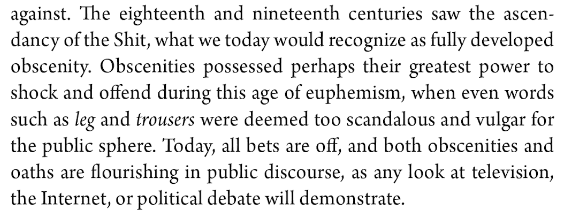
So the double standards in the laws enacted at this time are especially incongruous and still damaging us to this day.
Now at least the law is trying to differentiate between being ‘offended’ and being ‘harmed’ by such words. Perhaps we can do the same when we hear the words ‘fuck’ and ‘cunt’. Letting go of the anger/ hurt pride/ fear we feel when we hear people saying those words, or when people say those words to us is seen by many psychologists as a journey to mental wellness in ourselves. Seeing it, understanding it, but rather than letting it affect us emotionally we check the context first, and our reaction without oppressing ourselves or others.
Phew!
Sounds a bit Zen, (again!) and sometimes, in the blattering of daily life, rather difficult to keep to. But no harm in having it, and some context and leftist counter narrative of our own, to have in our arsenal when confronted with
- genuine engagers,
- angry people made so by years of austerity and
- people whose verbal red lines might be different from ours
- people who are ‘new’ to a forum or event and might not ‘know the rules’
as opposed to
- bad actors,
- trolls,
- paid shills and bot accounts
- and people with whom we are guaranteed to disagree (over politics, or religion, or even our favourite TV shows 😉 !)
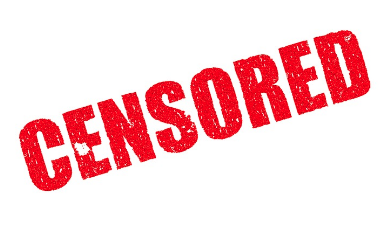
Leave a comment